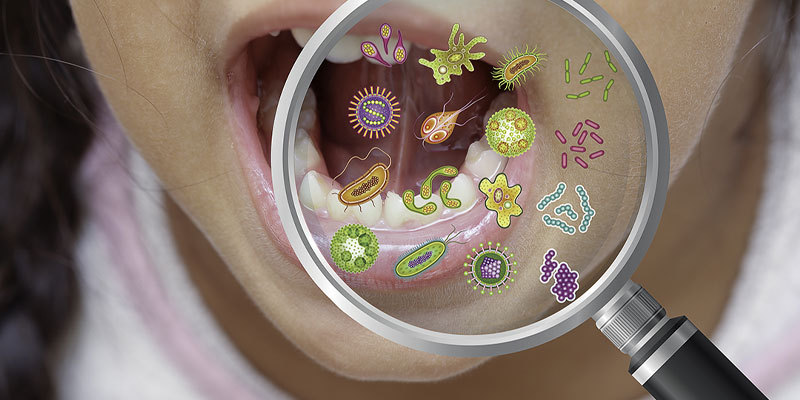- What is oral microbiome?
- What causes an oral microbiome imbalance?
- Is mouthwash bad for microbiome?
- What health problems can an unhealthy oral microbiome cause?
- How to maintain a healthy oral microbiome
Many people have heard of their core microbiome (also known as the gut microbiome), where most of the estimated 40 trillion bacteria in our bodies live. This microbial diversity, which resides in your intestines, plays a significant role in preserving our health and fighting off pathogenic bacteria.
However, did you also know that our oral cavity (mouth) is also host to significant bacterial diversity? This collection of bacterial genera, known as your oral microbiome, serves as the first line of defence to protecting your gut – and the rest of your body – from oral pathogens that can lead to not just oral disease but severe, life-changing illnesses in the human body.
What is oral microbiome?
Your oral cavity is home to over 700 known types of bacteria. The different microbial communities live in these oral sites:
- The tongue
- The teeth
- The hard palate
- The area directly around tooth surfaces
- Above and below the gums
What’s most significant about the bacteria in your oral cavity is that it’s the meeting point between the outside world, your immune system, and the alimentary canal (along which food passes through your body). This means that the health of your oral microbiome will have a direct influence on not only your gut health but also your overall well-being.
What causes an oral microbiome imbalance?
When the oral bacteria within your mouth live in harmony, this is called a state of symbiosis, or a “balanced” oral microbiome. Symbiosis in your oral microbiome will protect your health and help you avoid disease.
Conversely, an imbalance in the bacterial communities can occur when changes in your oral cavity cause a breakdown in the relationship between oral microorganisms. This imbalance is known as being in a state of dysbiosis, leading to inflammation, illness, and disease.
For example, dysbiosis can be triggered by dietary or lifestyle changes that inhibit saliva flow. The reduction of saliva causes a shift in our oral ecosystem that allows acid-producing and acid-tolerant bacteria – otherwise known as plaque – to grow at the expense of the good bacteria. This leads to cavities, tooth decay, and gum disease.
Two of the bacteria taxa that can cause oral health issues are:
- Streptococcus Mutans: This species of bacteria is the contributor to the development of cavities
- Veillonella: This bacterium can also lead to cavities, especially in young children
The development of these and other oral bacteria results from the oral microbiome imbalance, which can lead to infection and many other unwanted systemic diseases.
Is mouthwash bad for the microbiome?
Many conventional types of mouthwash advertise that they kill “up to 99.9% of oral germs”, which at first glance sounds ideal for keeping your mouth clean and fresh.
However, this claim raises concerns, as your mouthwash won’t discern between good and bad bacteria. If enough good bacteria are eliminated, you could be potentially eliminating your oral cavity’s built-in immunities to disease.
Additionally, overuse of conventional mouthwash can dry out your mouth. It’s best to avoid the harm that these mouthwashes can bring by using a brand that supports the microbiota of the mouth and helps prevent a bacterial imbalance that can lead to illness.
What health problems can an unhealthy oral microbiome cause?
When your oral microbiome is imbalanced, you could develop several oral health issues, including:
- Tooth decay and dental cavities from acids eating away at the protective enamel on your teeth
- Gingivitis and periodontitis from the buildup of periodontal pathogens, including P. Gingivalis, along your gumline
- Oral thrush, which is the onset of creamy white lesions on your tongue, inner cheeks, the roof of your mouth, gums, tonsils, or back of your throat
An unhealthy oral microbiome can also lead to other significant issues through bacteremia. This occurs when bacteria exit the oral cavity through the gums and into the bloodstream.
Infections will usually attack your gut first but can also lead to several infectious diseases, including:
- Inflammatory bowel diseases, including inflammatory bowel syndrome (IBS), Crohn’s disease, and ulcerative colitis that cause chronic, persistent inflammation
- Scarring of the liver known as cirrhosis
- Risk of pancreatic cancer, as we all as cancer of the gastrointestinal system and liver
- Peptic (stomach) ulcers from the Helicobacter pylori bacteria (H. pylori)
- Cardiovascular disease
- A weakened immune system, as your gut microbiome plays a significant role in protecting your body’s ability to fight off inflammation and disease
- Degenerative brain disease, such as Alzheimer’s disease and dementia, due to the gut-brain axis that connects gut health with brain health
- Nervous system conditions, including anxiety
- Diabetes, the risk of which increases after the development of periodontitis
Medical researchers also believe that unhealthy oral microbiomes can result in adverse pregnancy outcomes if the mother has periodontal disease and the associated bacteria passes to the placenta and fetus.
How to maintain a healthy oral microbiome
Naturally, you want to keep your oral microbiome in a healthy state of symbiosis to avoid plaque buildup and the health problems associated with an unhealthy mouth. The easiest way to do this is to follow a proper oral health routine, including:
- Tooth brushing twice per day with a fluoridated toothpaste
- Floss your teeth once per day
- Use a tongue scraper to remove unwanted bacteria from your tongue
- Eliminate sugary treats and beverages from your diet
- Drink fluoridated water
- Avoid alcoholic beverages
- Don’t smoke or use oral tobacco products
- Avoid oral piercings, including on your tongue
- Visit your dental professional at least twice per year for thorough dental cleanings, examinations, and treatment
Remember, your mouth is the gateway to your body. Be sure to keep it fresh, clean, and healthy by following the above tips and asking your dentist any questions you might have about preserving your oral microbiome. It’s one of the best ways to help you live a long, healthy life!
Learn more about preserving a healthy oral microbiome at Yonge Eglinton Dental in Toronto.
At Yonge Eglinton Dental, our dental practice can help you not only have a wonderful, healthy smile but also help take care of your overall well-being. Make an appointment today by calling our office at 416-932-2222 or booking online. We look forward to seeing you!
Are you concerned about visiting the dentist? Read about how we protect the health and safety of our patients and staff so your family can seek proper dental care with peace of mind.








